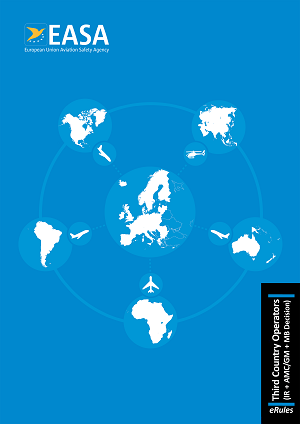Regulation (EU) 2023/659
This Annex (‘Part-TCO’) establishes requirements to be followed by a third country operator engaged in commercial air transport operations into, within or out of the territory subject to the provisions of the Treaties.
ED Decision 2023/006/R
TECHNICAL LANDING
The intended use of an aerodrome located in the territory subject to the provisions of the Treaties as a technical stop (e.g. for the purpose of refueling or crew change) as part of a CAT operation falls within the scope of TCO.100 and requires a TCO authorisation.
ALTERNATE AERODROMES
The selection and use of an aerodrome located in the territory subject to the provisions of the Treaties as an alternate aerodrome for the case of an in-flight diversion does not fall within the scope of TCO.100 and does not require a TCO authorisation.
CODE-SHARE AGREEMENTS
An aircraft used by a third country operator under a so-called code-share agreement with a Member State operator only falls within the scope of TCO.100 and is required to hold a TCO authorisation if the aircraft is used to perform commercial air transport to the territory subject to the provisions of the Treaties.
WET-LEASE AGREEMENTS
A third country operator that leases out aircraft under a wet-lease agreement falls within the scope of TCO.100 and is required to hold a TCO authorisation for aircraft under its air operator certificate (AOC) that are used to fly to the territory subject to the provisions of the Treaties.
Third country operators currently not holding a valid TCO authorisation may wet-lease-in aircraft from other authorised third country operators or from Member State operators for the purpose of flights to the territory subject to the provisions of the Treaties.
DRY-LEASE AGREEMENTS
A third country operator that leases out aircraft under a dry-lease agreement does not fall within the scope of TCO.100 and does not need a TCO authorisation. The requirement to hold a TCO authorisation for aircraft used to fly to the territory subject to the provisions of the Treaties rests with the operator that has dry-leased-in the aircraft and is responsible for the operation and airworthiness under its AOC.
OTHER TYPES OF OPERATION
The following types of operations do not fall within the scope of TCO.100 and do not require a TCO authorisation:
— Operations conducted by third country operators that are excluded from the scope of Regulation (EU) 2018/1139, such as flights referred to in Article 2(3)(a) of that Regulation (e.g. military, customs, police, search and rescue, firefighting),
— General Aviation operations,
— Flights arranged by means of diplomatic clearances,
— Any other type of operations that do not fall under the definition of commercial air transport (e.g. ferry flights to a maintenance basis or delivery flights).
Specialised operations (e.g. hoist, photographic or surveillance operations) do not fall within the scope of TCO.100 and do not require a TCO authorisation but may require an approval from the Member State(s) concerned.
Regulation (EU) No 452/2014
(a) The third country operator shall ensure that any person authorised by the Agency or the Member State in whose territory one of its aircraft has landed will be permitted to board such aircraft, at any time, with or without prior notice to:
(1) inspect the documents and manuals to be carried on board and to perform inspections to ensure compliance with Part-TCO; or
(2) carry out a ramp inspection as referred to in Annex II to Commission Regulation (EU) No 965/2012 of 5 October 2012.
(b) The third country operator shall ensure that any person authorised by the Agency is granted access to any of its facilities or documents related to its activities, including any subcontracted activities, to determine compliance with Part-TCO.
